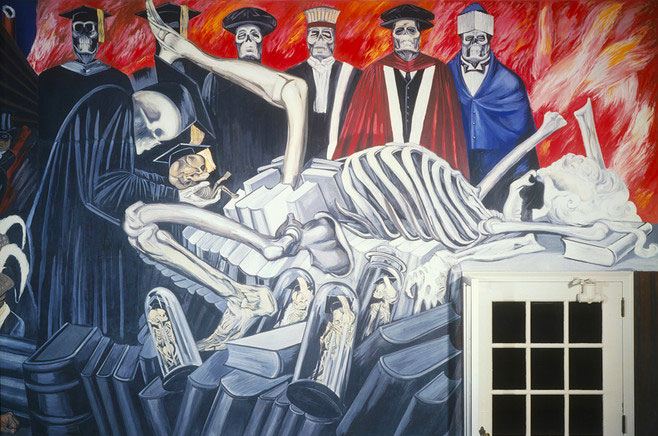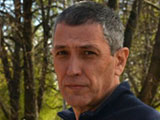Ungovernable for Us: Part III
by Israel Centeno and translated by Kelly Harrison / March 13, 2014 / No comments
Institutions, history, and the peace-less cycle of violence in Latin America.

Gods of the Modern World (1932), Jose Clemente Orozco. Dartmouth College.
All violence is justified in Latin America by means of increasingly vague and distorted legends of heroism. For example, the drug lord Pablo Escobar, head of the Medellín cartel, was considered by his people to be a liberator, a modern day Robin Hood, a rebel against the oligarchy.

- From his lonely watch post Albert Camus asked who among us has not experienced exile yet still managed to preserve a spark of fire in their soul. “We’re all alone,” Natalia Sedova cried in exile on hearing of her husband Leon Trotsky’s affair with Frida Kahlo. In his novel Night Watch, Stephen Koch follows the incestuous love affair of David and Harriet, wealthy siblings watching the world from their solitary exile. Koch’s writing, Camus’s theories, and Trotsky’s affair all come back to exile and lead me to reflect on the human condition. From my own vantage point, my Night Watch, I will reflect on my questions of exile, writing, and the human condition.

- Israel Centeno was born in 1958 in Caracas, Venezuela, and currently lives in Pittsburgh as a Writer-in-Residence with City of Asylum/Pittsburgh. He writes both novels and short stories, and also works as an editor and professor of literature. He has published nine books in Venezuela and three in Spain.
Nobody even looks at the words of the man who lost his hero status once he faced his failure. The “few certain results,” the realistic inventory that Simon Bolívar listed in his letter to General Juan José Flores, have not been carefully considered—or, if they have, they were not deemed conducive to the promotion of “Bolívar the Liberator” as the center of a secular religion, as the icon that justifies each of our intentions and inanities, as the spiritual leader of all our individual and collective dreams. It is frustrating. The “certain results” that Bolívar inventoried should constitute a legitimate limit, a legacy, yet they’re rarely used to promote the idea of citizenship. Instead, the call of “we shall fight to the death” will always prevail over any concept that could distance us from the war cry.
The failure of our political modernization projects brings with it the impossibility of economic modernization. These both lead to the prevalence of violence in all fields and spaces. We have spent decades talking about democracy—insulting it or defending it—yet, in truth, very few of our nations can honestly say that they have been able to sustain full democracies. Instead, they blur the concept of a settlement or population to make room for the notion of citizenship. Many of us even call ourselves democrats and, indeed, we manage some of the theory behind democracy, but the temptation to save face means we always end up as men of honor, true women, exceptional individuals. However, when the truth is considered in absolute terms, we find ourselves deeper in the territories of fanaticism and violence than in those of a modern democracy. In many of our countries, freedom hasn’t failed, because it was never there in the first place. Similarly, the aim of delivering equality to our populations hasn’t failed, because there never was such an intention. Democracy hasn’t failed, because we’ve confused its institutions with palaces where power is flaunted and abused. Over the course of two hundred years of history, the violence inherited from our wars of liberation has worn different masks, gone by many names, been described in various ways and ridden the horses of many leaders. Emancipation has not yet come to an end; it’s a matter that must still be resolved. It is a simple cycle: Once the original cause is betrayed—and it is always betrayed—someone is then predestined to defend it. Our inability to achieve a long-lasting order of freedom has been painted over with various layers of nationalism and ideology. And now we are naked, still living in post-war aridity, justifying the aftermath and searching for new figures to give us humanity and direction, calling it an uprising, a revolution, a hunger for justice and democracy. But, in the end, it’s the same as always. We seek an outside source to blame, something distant, to avoid the disgrace of realizing that we are the accomplices and executioners, forging our own ill-fated reality over the years.
I was tempted, in a first draft of this article, to delve into certain personal experiences, since, in some ways, I am much like the protagonist of Roberto Bolaño’s story “El Ojo Silva”: I belong to his generation and yes, I was born into violence. I wanted to do it because I feared that I “couldn’t escape without being called a coward or a traitor,” but once I reviewed my thoughts on the subject, I felt uncomfortable. It was necessary to rebel against the stigma, the stigmata of violence. A citizen doesn’t desert or betray; he changes his mind, he thinks differently. He doesn’t have to show courage in anything other than the daily defense of his civility and his rights, and he should begin by learning that he has such rights. When all is said and done, in this unfortunate continent, our saviors are usually the founding and re-founding fathers of the nation, yet none are or have been good fathers to their children. Perhaps this is one of the most dramatic causes of exclusion and violence, and has led to the denial of any right to peace.




